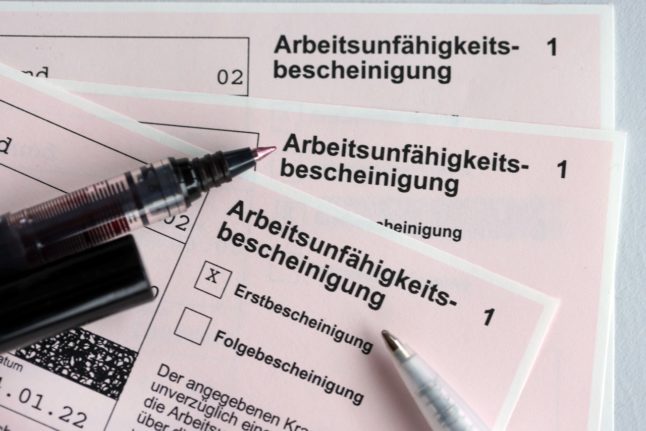Absences from work have hit an all-time high in Germany, according to a new report on sick leave by statutory insurer AOK.
In its AOK Absenteeism Report 2023, the health insurer revealed that there had been 216.6 cases of sick leave per 100 employed insured persons last year.
This marks a significant jump from the years 2012-2021, when the average stood as 159.7 cases per 100 employees.
This increase of more than 30 percent was mainly caused by respiratory illnesses, including Covid-19. In 2022, this type of illness accounted for 86.5 periods of sick leave per 100 insured persons, compared to 36.3 cases the year before.
Home office was largely phased out in 2022, meaning far more employees were asked to come into their place of work even as the Covid virus remained prevalent during the colder months.
The proportion of employees unable to work – a value known as the ‘incapacity to work rate’ – also crept up to 6.7 last year. In the two years prior to that, it was 5.4 percent.
Presenting the results of the survey, Johanna Baumgardt from the Scientific Institute of the AOK (WIdO), expressed uncertainty over how the situation would develop.
“It remains to be seen how absenteeism will develop in the further course of the year against the background of increasing Covid 19 infections and the usual seasonal peak in respiratory illnesses,” she said.
READ ALSO:
- Reader question: Can I take sick leave in Germany without visiting a doctor?
- Could there be a new wave of Covid-19 in Germany this autumn?
Mental illness on the rise
Alongside the impact of the Covid pandemic, there was also a steep rise in the number of employees battling mental health problems.
According to AOK, absences due to mental illness have increased 48 percent since 2012 – and this type of sick leave is associated with much longer periods of absence.
The rise in mental health issues appears to be at least partially linked to stress and uncertainty in the workplace.

In the study, a significant proportion of employees in Germany complained that they were overburdened and stressed at work, with 78 percent complaining of exhaustion, 75 percent of anger and annoyance and 66 percent of listlessness.
READ ALSO: ‘Stressful experience’: How hard is it to find an English-speaking therapist in Germany?
The situation has improved slightly since the height of the Covid pandemic, but stress and exhaustion remain prevalent in industries such as health, education and banking, AOK revealed.
However, employees who had a positive perception of their company’s future were generally less susceptible to absences.




 Please whitelist us to continue reading.
Please whitelist us to continue reading.
Member comments